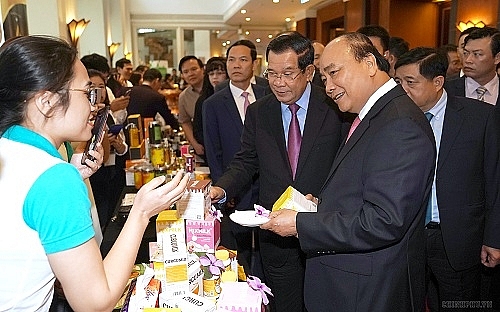Expanding Vietnamese business in Cambodia
 |
The two prime ministers visiting booths at the Vietnam-Cambodia Investment and Trade Promotion Conference
One of the five largest investors in Cambodia, Vietnamese businesses are always highly appreciated for their good performance and contributions to socio-economic development.
At the Vietnam-Cambodia Investment and Trade Promotion Conference held on October 4, 2019 in Hanoi, chairman of Vietnam Rubber Group Tran Ngoc Thuan said that after more than ten years of investing and doing business in Cambodia, Vietnam Rubber Group has established 16 subsidiaries to develop 20 projects across seven provinces of Kratie, Ratanakiri, Kampong Thom, Mondul Kiri, Siem Reap, Oddar Meanchai, and Preah Vihear.
The total registered investment of VRG is $1.175 billion. In Cambodia, VRG plants rubber on 87,892 of the total 120,291 hectares registered, as well as developed five factories processing rubber latex at the plantation areas. The group has created more than 20,000 jobs for local people and developed infrastructure at its operation sites.
"However, the price of rubber latex is falling while the productivity of newly-planted rubber gardens is still low. VRG's projects have yet to turn profit, so they have contributed little to the Cambodian state budget. But I am positive that the projects will develop and business performance will improve in the time coming," chairman Thuan said.
Another well-known agricultural product in Cambodia made by a Vietnamese investor is Angkormilk. As the first dairy plant in Cambodia, Angkor dairy plant has been invested $23 million by Vinamilk with the annual capacity of 48 million litres of milk.
"We bring condensed milk, fresh milk, and yoghurt made in Cambodia to local people. These are made in world-standard quality and are good for children while matching the income of Cambodian people. That is why we chose Angkormilk as the general brand name for all products," the representative of Vinamilk stated at the conference and confirmed raising the plant's annual capacity to 90 million litres of milk.
In the opinion of Huong Tran Kieu Dung, CEO of FLC Group, Cambodia is a promising land with rich natural resources, stable economic growth, proactive co-operation, and the mobilisation of FDI. "We would like to bring our rich experience to Cambodia through resort and premium hotel projects in Phnom Penh, Siem Riep, Sihanoukville, as well as launch direct flights from Vietnam's cities and tourism locations in Cambodia, or develop hi-tech agricultural projects in Cambodia," he said.
FLC Group sees a lot of promising tourism co-operation opportunities between the two countries. Vietnam has been one of the top countries in terms of visitors to Cambodia in the last five years, as it takes only one or two hours to fly from Hanoi or Ho Chi Minh City to Phnom Penh.
"We see huge potential in the country and going to develop an eco-system connecting the tourism industries of the two countries, boosting the number of Cambodian visitors flying Bamboo Airways to Vietnamese tourism locations to stay in FLC resorts," added the CEO.
At the conference, Neak Oknha Kith Meng, chairman of the Council for the Developement of Cambodia (CDC) confirmed the good, friendly relations between the two countries, which is the foundation for the businesses communities to invest both ways.
"In addition to the sectors of agriculture, forestry, finance, banking, and insurance, where Vietnamese enterprises are doing very well in Cambodia, we also call for investment into other promising segments like food processing, tourism, construction, household equipment, automobile, power, and pharmaceuticals," the chairman said.
Cambodia has maintained a growth speed of 7.7 per cent on average over the last decades. Key motivation for growth are the construction as well as the textile and footwear industries, which are also promising sectors for investors. - VIR
Nguyen Huong



